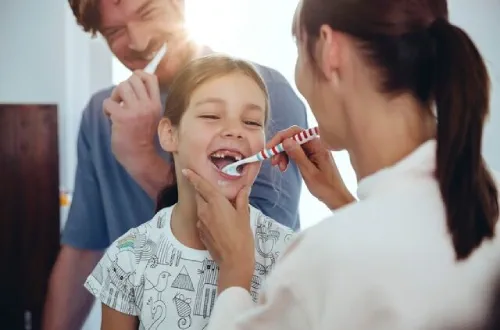Parents and Children:
Dental health during primary school years
5 to 11 years: what to expect
Say hello to the age of wobbles, gaps and visits from the Tooth Fairy. As your not-so-little-one continues to look more and more grown up by the day, so does their smile.
Adult teeth normally start to make an appearance around the age of six or seven. These are for keeps, so that means regular trips to the dentist, thorough brushing and healthy dental habits are more important than ever before.
Especially as your child will be starting to assume increasing responsibility for their own dental hygiene around this age too.
Learning to brush solo – when’s the right time?
When should my child start brushing their own teeth? It’s a question we get asked a lot. The honest answer is: it varies greatly from child to child. Some will be ready for the responsibility earlier than others. And some will need a little more supervision.
We tend to recommend a child doesn’t start brushing their own teeth unsupervised at least until the age of seven. Your dentist will be more than happy to help you decide when the right time is for your child.
They’ll give you plenty of advice on how to keep a close eye on your little brusher’s progress – as well as tips on more advanced essential dental hygiene techniques like flossing.
“A hygienist appointment is a great way to introduce your child to things like flossing.”
Dr Zena Aseeley, Bupa Dental Care Dentist.
Permanent teeth: preparing for their forever smile
As your child’s 20 baby teeth start to make their way to the Tooth Fairy, you’ll begin to see the first of 32 permanent incisors, canines, pre-molars and molars filling the gaps.
These tend to appear around the age of six or seven, with the bottom front teeth normally being the first to arrive. Closely followed by their adult first molars (back teeth).
Depending on the alignment and amount of space available for these permanent teeth to settle into, your dentist might refer your child to an orthodontist between the ages of 10 and 13. They will be able to advise around the best way to ensure your child develops a confident, straight forever smile.
Eat. Brush. Floss. Repeat.
Your increasingly independent child will start to make more choices about the foods they eat. While it’s incredibly difficult to steer them away from sugary foods all the time, it’s great to have a couple of tasty sugar-swaps up your sleeve.
Brushing for two minutes, twice a day remains incredibly important. Another way to combat the negative effects of high-sugar foods is to reduce how often they are eaten throughout the day. Each time your child consumes even a small amount of sugar, their teeth are exposed to decay- so it’s important they aren’t snacking too often and are brushing after eating sugary foods.
Your dentist will also recommend the right time to introduce your child to flossing, or inter-dental brushing, to help dislodge food particles.

Believe it or not, we encourage flossing before brushing, because it loosens bacteria and cleans out spaces between teeth, so when you brush the fluoride in your toothpaste can penetrate your entire mouth.

“Try to limit your child’s sugar intake and reduce grazing to five times a day – breakfast, lunch, dinner and two snack times.”
Dr Zena Aseeley, Dentist, Bupa Dental Care
Bupa Dental Care can help you make the right decisions for your child, at every stage of their development. Check out our children’s dental blog for creative ideas to keep your kid’s mouth healthy, including sugar swaps and tackling the tooth fairy.

Advice and inspiration for every stage of childhood
Toddler and Pre-school
How to win the brushing battle and teach healthy dental habits that last a lifetime.
Baby
Teething, brushing, weaning: everything you need to know about your baby’s first year
Mum-to-be
Find out how you can start looking after your baby’s smile long before they’re even born.
Children’s Dental Blog
Smart sugar swaps. Making the dentist less scary. Tackling the tooth fairy. Our blog has it all.
Parents and Children
From NHS Dental check-ups to encouraging good oral hygiene, we can help you keep your children’s teeth healthy and happy.
^ We may record or monitor our calls.
Bupa Dental Care is a trading name of Oasis Dental Care Limited. Registered in England and Wales No: 00478127. Registered office: Bupa Dental Care, Vantage Office Park, Old Gloucester Road, Hambrook, Bristol, United Kingdom BS16 1GW.
Oasis Dental Care Limited has a number of trading names including Bupa Dental Care. Please see the list of our different trading names.


